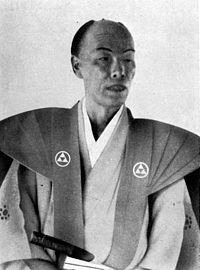Yokoi Shounan
| Yokoi Shōnan | |
|---|---|

Yokoi Shōnan
|
|
| Born |
September 22, 1809 Kumamoto, Japan |
| Died | February 15, 1869 (aged 59) |
| Nationality | Japan |
| Other names | Yokoi Tokiari |
| Occupation | Politician, political theorist |
Yokoi Shōnan (横井 小楠?, September 22, 1809 – February 15, 1869); was a Bakumatsu and early Meiji period scholar and political reformer in Japan, influential around the fall of the Tokugawa bakufu. His real name was Yokoi Tokiari.
Yokoi was a samurai born in Kumamoto, Higo Province (present-day Kumamoto Prefecture), and a distant descendant of Hōjō Takatoki. He was sent by the domain to Edo in 1839 for studies, and developed contacts with pro-reform members of the Mito domain. After his return to Kumamoto, he started a group to promote the reform of domain administration along Neo-Confucianism lines, opening a domain school called Shōnan-do.
In 1857, he was invited by the daimyō of Echizen, Matsudaira Yoshinaga to become his political advisor. While in Fukui, Yokoi wrote "Kokuze Sanron" (the Three Major Discussion of State Policy). One of the topics covered in Yokoi’s treatise was on state religion, in which Yokoi commented that although Japan had Buddhism, Shinto, and Confucianism, it lacked a true national religion in the manner of western nations, and that this lack was a weakness in the Japanese kokutai, which placed Japan at a disadvantage to the western powers. This concept provided one rationale underpinning the formation of State Shinto in the later Meiji period Empire of Japan. In the same treatise, he also stressed the importance of a strong navy for the defense of Japan.
...
Wikipedia
